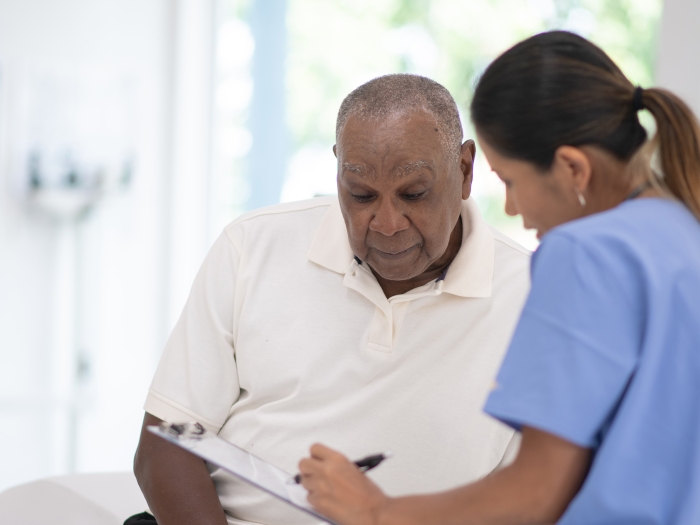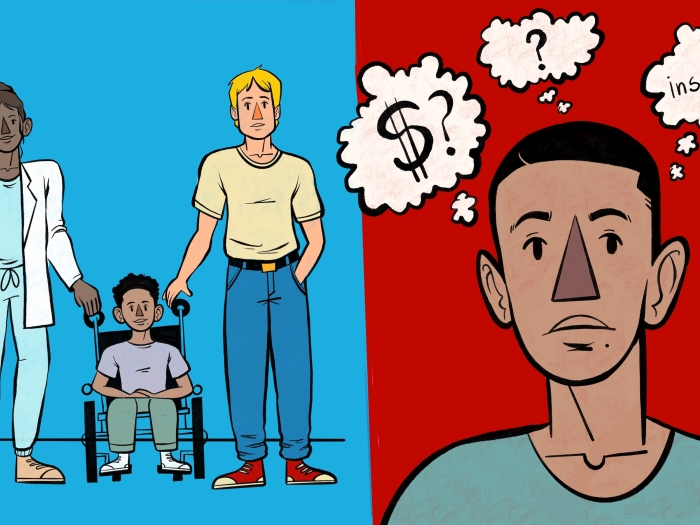A medical student discusses an innovative platform designed to elevate diversity, equity and inclusion.
5:00 AM
Author |

The University of Michigan Medical School's Student Diversity Council is a forum that promotes diversity, equity and inclusivity, as well as accessibility and justice, throughout the organization's medical campus. It was created a decade ago to ensure that students from varying communities are supported and can thrive within the curricular and extracurricular spaces at the medical school.
Erica Jaiyeola Odukoya, a fourth-year medical student at U-M, served as co-chair of the council with Oluyemi Olumolade from 2020 to 2021, and recently presented about the council's many realms at the American Medical Association's ChangeMedEd 2021 virtual conference. Every year, this event focuses on "training [the] next generation of physicians," while promoting innovation as they are encouraged to "proactively respond to challenges."
Here, Odukoya talks to Michigan Health Lab about U-M's Student Diversity Council, as well as her innovative presentation.
Amplifying diversity, equity and inclusion for med students through education, activism and outreach
Talk about the U-M Medical School Student Diversity Council and why its work is so important.
Odukoya: The big picture is that I'm a part of a huge team of student leaders. There were 14 of us and we always aimed to represent the entire community of U-M Medical School. The diversity council is a collective effort that I was honored to serve. My presentation was just one of a few at various conferences that helped us share the importance of our work.
Our focus is all students, but we aim to amplify the voices, experiences and needs of those with marginalized identities, including persons with disabilities (that may be visible or invisible), as well as the Asian American and Pacific Islander, LatinX, LGBTQIA+, Pansexual and Poly, Black and Indigenous communities. This, of course, is not an all-encompassing list. We really focus on anyone that needs our support.
Our work on the council primarily supports a culture and environment that shows these students that they belong at U-M Medical School and on a larger scale, in the field of medicine. While the council has existed for over 10 years, there was a tipping point after the murder of George Floyd, followed by the various movements for social justice across the country. In late May of 2020, student leaders involved in groups such as the Action Committee, Black Medical Association, Caring for Communities of Color and many others came together and pushed for more to be done in addressing social traumas both inside and outside of U-M Medical School.
Many students came together to restructure the diversity council to include three core tenants, which are education, outreach and activism. These serve as the main pillars for our work. When a social trauma occurs – even outside of our medical school, for example – it's important for us to collaborate with internal leaders to communicate to our education community.
Traditionally, we have an executive board comprised of 14 student leaders and then, a general body, which is comprised of the student organizations that address our core pillars. We meet once a month throughout the year and cross collaborate to identify the needs for our students.
How does the student diversity council work in tandem with medical school leadership and/or other departments on campus?
Odukoya: We regularly work with the Office of Medical Student Education and we are sponsored by the Office for Health Equity and Inclusion, which is better known as OHEI. We meet with both leadership and representatives of these offices to better align ourselves with each other's goals and work together in carrying out our collective efforts.
We also have Michigan Medicine staff and faculty leaders who help us every step of the way. And their support is immeasurable. Currently, these individuals are Oluwaferanmi O. Okanlami, M.D., M.S., and Karri Grob, Ed.D., M.A.
In addition, we work with the medical school's student council, as we meet with them once a month to learn about their objectives, while encouraging collaboration. We often connect with the deans of the school to make sure that we are acting as an effective liaison on behalf of the student body, while addressing their various needs.
You presented at this year's American Medical Association conference. Why was that content so important?
Odukoya: It was a labor of love in so many ways. The presentation was entitled, "Implementing a Vertical-Integration Model with Sustainable Administrative-Student Collaborations for Transforming Health Systems Science to Amplify Diversity, Equity, Inclusivity, Accessibility and Justice."
Over the past year, the diversity council has presented 13 abstracts and five oral presentations at many different conferences on a variety of topics, including wellness, burnout, mental health, best practices in health education and other subjects. And this is just a testament to the fact that we're really hoping to enact change through our work.
MORE FROM THE LAB: Subscribe to our weekly newsletter
I even recently spoke with students at Columbia University about implementing a council like ours, which really demonstrates the level of interest in this subject matter.
At this year's ChangeMedEd 2021 virtual conference, the core of our presentation was based on how we used a business model to create our structure. Because medical education is new in comparison to other disciplines, the integration and exchange of ideas and resources from other areas isn't uncommon.
While traditional health science systems are based on the unilateral transmission of knowledge, this precludes students from meaningfully contributing to their own learning. These systems are also inherently built on racial hierarchies, biases, prejudices and social constructions of things like race, gender and sexual orientation.
However, the U-M Student Diversity Council is designed to amplify the voices of our medical students through creating structures that are consistent and reliable. By serving as an effective conduit to leadership and other instrumental parties, the council aims to dismantle social constructs in medicine and medical education, while creating a learning environment where all students can thrive.
Like Podcasts? Add the Michigan Medicine News Break on iTunes, Google Podcasts or anywhere you listen to podcasts.

Explore a variety of health care news & stories by visiting the Health Lab home page for more articles.

Department of Communication at Michigan Medicine
Want top health & research news weekly? Sign up for Health Lab’s newsletters today!





